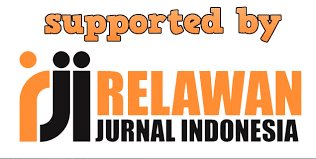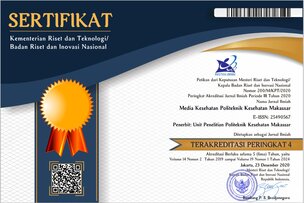CONVENTIONAL EDUCATIONAL WITH INDOOR & OUTDOOR MODULES ON DISASTER PREPAREDNESS IN HIGH SCHOOL STUDENTS IN TOMOHON
Abstract
Indonesia is one of the countries that experiences quite a lot of natural disasters such as floods, landslides, earthquakes, volcanic eruptions, tsunamis. Increased volcanic volcanic activity in Indonesia's volcanoes allows for potential eruptions in several regions. Disasters that occur in the community require good handling based on targeted disaster management, given that disasters come unexpectedly, for that many things must be prepared carefully including educational interventions on disaster management. This study aims to determine the differences using conventional indoor modules and modules indoor & outdoor on volcanic disaster preparedness in high school students in the city of Tomohon, North Sulawesi.
The research design in this study was Quasi experiment one group pre-post-test. In this design high school students were given a pretest before being given education to find out the initial condition, and posttest after being given education, then it would be known whether there was a difference between the scores pretest and posttest . The population in this study were all Lokon high school students, and the sample was 10th grade students totaling 60 people, held in September 2016.
The results showed that the experimental group student learning outcomes were better than the control group. The average posttest value of the experimental group students (73.27) was higher than the mean value of the control group posttest (66.17). thus there are differences in scores in the group given the indoor module intervention with the indoor-outdoor module intervention group with a value of p 0.001. (t independent test)
Based on the results of the study concluded that there are differences in knowledge between students who are taught using the method indoor learning with students who use methods indoor & outdoor learning. Suggestion: expected teaching methods indoor + outdoor can be developed as a variety of learning methods
Keywords: conventional Education, indoor & outdoor modules, Disaster
Keywords
Full Text:
PDF (Bahasa English)References
National Disaster Management Agency 2007
David Alexander, Luca Bramati, Massimo Simonetta (2009) Emergency Preparedness Training and Education in Lombardy Region, Italy: Survey of Supply and Demand, Natural Hazards Review: 77-83.
Dharma, KK (2011) Nursing Research Methodology. Jakarta: Trans Media Info.
Hochrainer, Stefan (2010) Assessing The International Macroeconomic Impacts of Natural Disasters Institute of Applied System Analysis.
Jane Miller (2014), Improving Emergency Preparedness System Readiness Through Simulation and Interprofessional Education, Public Health Reports: 129-135.
Jane R. Montelegre, et al (2004) An Innovative Public Health Preparedness Training Program for Graduate Students, Public Health Reports: 441-446
Margaret P (2010) The Evidence Base For Effectiveness of Preparedness Training: A Retrospective Analysis.
Noor D, (2006) Environmental Geology. Yogyakarta Graha Politics
, DT, Beck CT & Hunger BP (2006) Essential of Nursing Research: Methods appraisal and Utilization (6th ed.) Philadelphia: Lippincott
Sugiono (2010) Qualitative Quantitative Research Methods and Bandung R & D: Alfabeta
Law No.24 2007 concerning Disaster Management
DOI: https://doi.org/10.32382/medkes.v14i1.708
Refbacks
- There are currently no refbacks.
Copyright (c) 2019 Media Kesehatan Politeknik Kesehatan Makassar
Published By : Poltekkes Kemenkes Makassar
Office : Jl. Wijaya Kusuma Raya No. 46 Banta-Bantaeng, Kota Makassar, Sulawesi Selatan, Indonesia
Email : mediakesehatan@poltekkes-mks.ac.id
Media Kesehatan indexed by :
Protected By  |  |

This work is licensed under a Creative Commons Attribution-NonCommercial-ShareAlike 4.0 International License.




